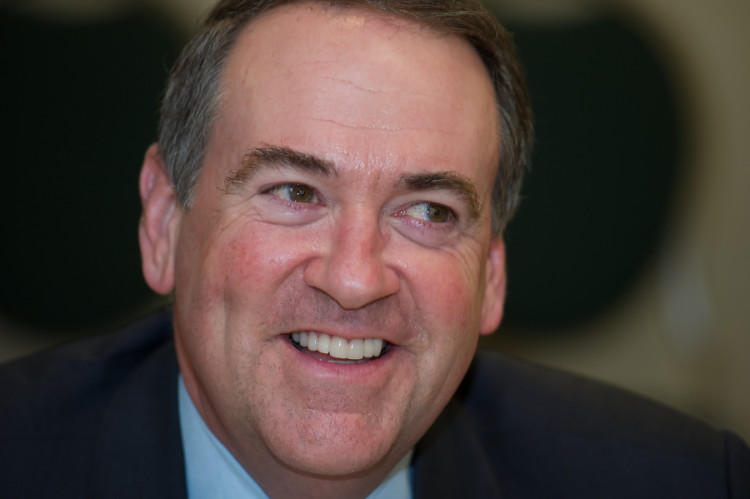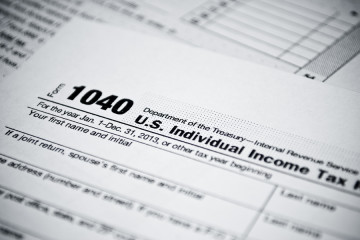Terrorism Dominates Republican Debate But So Do Personal Attacks

©2015 Bloomberg News
NZFLJX6KLVR6
NZFLJX6KLVR6
(Bloomberg) — Republican presidential candidate Donald Trump joined President Barack Obama and Democratic front-runner Hillary Clinton as targets of fierce attacks Tuesday at a televised debate dominated by concerns over terrorism and sharp- tongued skirmishing among candidates trying to break out of the middle of the pack.
The meeting offered the starkest yet confrontation between the party’s hawks and its more libertarian-leaning candidates in a debate about American security at home and abroad.
After New Jersey Governor Chris Christie called President Barack Obama a “feckless weakling” and promised to shoot down Russian planes, Senator Rand Paul of Kentucky snapped: “If you are in favor of World War III, you have your candidate.”
The first attacks of an incendiary debate focused on the front-runner: “Donald is great at the one-liners, but he is a chaos candidate and he’d be a chaos president,” former Florida Governor Jeb Bush said. “He would not be the commander in chief we need to keep our country safe.” Later as the two tangled over airtime, Bush snapped at Trump: “You’re not going to be able to insult your way to the presidency.”
But with less than two months remaining before the Feb. 1 Iowa caucuses and the Feb. 9 New Hampshire primary, other candidates quickly muscled their way into the scrum—and the prime-time limelight. Two particular confrontations dominated the initial hour of the main debate: Trump versus Bush and one between two Cuban-American freshmen senators: Ted Cruz of Texas and Marco Rubio of Florida.
But one hour into the debate, the expected confrontation between Trump and Cruz, who has overtaken the billionaire in Iowa polls, had yet to occur.
Rubio attacked Cruz, who has been surging in recent polls, over a variety of issues, criticizing the Texan for voting against spending bills that included military funding. “You can’t carpet bomb ISIS if you don’t have planes and bombs to attack them with,” he said.
Rubio also attacked Cruz for voting also attacked the Texan’s vote earlier this year in favor of a law that put restrictions on how much phone data the National Security Agency can gather without a warrant, saying that Cruz “took away a tool” that allowed law enforcement “to know who terrorists have been calling.”
Cruz said Rubio had thrown “more than a few insults in this direction” in recent weeks and that he’d supported foreign policy put forward by Obama and Clinton that he argued has made the world less safe.
Paul, whose lagging poll numbers made his presence on the prime-time debate stage doubtful until the last minute, counterpunched at Rubio. “Marco can’t have it both ways,” said the Kentuckian, complaining about Rubio’s refusal to support restrictions on refugees. “He’s the weakest of all the candidates on immigration.”
Former Hewlett Carly Fiorina knocked Cruz and Rubio as not being ready to be a commander in chief, saying the nation needs someone with executive experience and “not first-term senators who have never made an executive decision in their life.”
New Jersey Governor Chris Christie piled on the senators, sarcastically commiserating with viewers after one of their exchanges. “If your eyes are glazed over like mine, this is what it’s like on the floor of U.S. Senate,” he said.
The fifth and final Republican debate of 2015 marked the first time the candidates have met since two deadly terrorist attacks—in Paris on Nov. 13 and in in San Bernardino, California on Dec. 2—shook Western societies and reshaped the domestic political agenda.
Trump called for a ban on Muslim travel to the U.S. five days after the California killing spree, perpetrated by a married couple who were inspired by the Islamic State, investigators have found. All the other Republican candidates, with the exception of Cruz, have sharply criticized his proposal.
It ignited passionate disagreements in an earlier undercard debate, and the frontrunner’s name came up within the first 10 seconds of the prime-time session. Paul accused the billionaire of embracing un-American ideals, such as wanting to “turn off that Internet thing.”
Trump later defended himself, saying that the Islamic State “is using the Internet better than we use the Internet.
“We should be using our most brilliant minds to figure out a way that ISIS cannot use the Internet,” he said.
On his proposal to ban Muslim travel to the U.S. he was also unapologetic. “We’ve opened up a very big discussion that needed to be opened up,” he said to applause from the audience at the CNN/Facebook debate held at the Venetian casino in Las Vegas.
“We need to start thinking about the needs of the American people before we go and try to solve everybody else’s problems,” Carson said. “The fact of the matter is the Middle East has been in turmoil for thousands of years. For us to think that we’re going to go in there and fix that with a couple of little bombs and a few little declarations is relatively foolish.”
In the undercard debate that took place earlier in the evening, four lower-polling candidates expressed feelings ranging from concern to outrage about the billionaire’s plan to ban Muslims from traveling to the U.S.
New York Governor George Pataki called Trump “the know- nothing candidate of the 21st century,” referring to a 19th century movement that targeted Catholic immigrants. He and Senator Lindsey Graham of South Carolina questioned Trump’s fitness to be the nation’s commander in chief.
“Declaring war on the religion only helps ISIL,” said Graham of the Islamic State. “It’s the worst possible thing you can do in this war,” he added, saying Trump’s proposed travel ban “has made us less safe.”
The debate starkly highlighted the two Republican camps on the question of how to respond to Islamic-inspired terrorism. Former Senator Rick Santorum of Pennsylvania accused Trump’s critics of overly punctilious political correctness.
“Not all Muslims are jihadists but all jihadists are Muslims,” Santorum said. Former Arkansas Governor Mike Huckabee gave voice to the one sentiment that united all of the Republican candidates: “We’ve lost confidence in our government,” he said.
One unifying factor at the debate: Obama and Clinton, his former secretary of state, whom Republicans accused of having pursued a feckless foreign policy that empowered terrorists.
“I blame Obama for ISIL not Bush. I miss George W. Bush,” said Graham of Obama’s predecessor. “We have the best military in the world. Obama’s put it in a box. Let’s take it out of the box before we get attacked here.”
Afterwards, Graham told reporters that he was so upset by the tone of some of his rivals he was nearly in tears on stage. “Some of these foreign policy discussions are hurting us,” he said.
Hours before the Republican debaters took the stage, Clinton, the Democratic presidential front-runner, delivered a national security address in which she blasted her Republican would-be rivals, taking direct aim at one of Cruz’s more colorful recent statements about how he’d handle Islamic terrorism.
“Promising to carpet bomb until the desert glows doesn’t make you sound strong,” said Clinton. “It makes you sound like you are in over your head.”
Despite being roundly condemned by most of his Republican rivals as well as President Barack Obama, Trump’s proposal on Muslim travel appears to have been a political winner: In last week, Trump has enjoyed a surge in national polls. The latest show him running 20 percentage points ahead of his next nearest rival, Cruz.
Cruz, however, is leading Trump in Iowa, where the Feb. 1 caucuses will launch the nominating contests, according to the latest Bloomberg Politics/Des Moines Register Iowa Poll. Trump, who has also taken notice of Cruz’s rise, called Cruz a “maniac” in an interview with Fox News Sunday where he also described the senator as having no Washington accomplishments.
Trump’s staying power at the top of national polls, however, has some Republican establishment figures are tentatively considering the possibility of Trump as the party’s nominee.
“Those of us who are angry about a lost seven years, we find we like what Donald Trump says in many cases about what’s wrong,” Representative Darrell Issa, who supports Rubio, said before the debate on Bloomberg Politics’ With All Due Respect. The California lawmaker questioned whether Trump can beat Democratic front-runner Hillary Clinton. “If he’s the nominee, I hope to move his policies to where he can beat Hillary Clinton,” he said.
The meeting offered the starkest yet confrontation between the party’s hawks and its more libertarian-leaning candidates in a debate about American security at home and abroad.
After New Jersey Governor Chris Christie called President Barack Obama a “feckless weakling” and promised to shoot down Russian planes, Senator Rand Paul of Kentucky snapped: “If you are in favor of World War III, you have your candidate.”
The first attacks of an incendiary debate focused on the front-runner: “Donald is great at the one-liners, but he is a chaos candidate and he’d be a chaos president,” former Florida Governor Jeb Bush said. “He would not be the commander in chief we need to keep our country safe.” Later as the two tangled over airtime, Bush snapped at Trump: “You’re not going to be able to insult your way to the presidency.”
But with less than two months remaining before the Feb. 1 Iowa caucuses and the Feb. 9 New Hampshire primary, other candidates quickly muscled their way into the scrum—and the prime-time limelight. Two particular confrontations dominated the initial hour of the main debate: Trump versus Bush and one between two Cuban-American freshmen senators: Ted Cruz of Texas and Marco Rubio of Florida.
But one hour into the debate, the expected confrontation between Trump and Cruz, who has overtaken the billionaire in Iowa polls, had yet to occur.
Rubio attacked Cruz, who has been surging in recent polls, over a variety of issues, criticizing the Texan for voting against spending bills that included military funding. “You can’t carpet bomb ISIS if you don’t have planes and bombs to attack them with,” he said.
Rubio also attacked Cruz for voting also attacked the Texan’s vote earlier this year in favor of a law that put restrictions on how much phone data the National Security Agency can gather without a warrant, saying that Cruz “took away a tool” that allowed law enforcement “to know who terrorists have been calling.”
Cruz said Rubio had thrown “more than a few insults in this direction” in recent weeks and that he’d supported foreign policy put forward by Obama and Clinton that he argued has made the world less safe.
Paul, whose lagging poll numbers made his presence on the prime-time debate stage doubtful until the last minute, counterpunched at Rubio. “Marco can’t have it both ways,” said the Kentuckian, complaining about Rubio’s refusal to support restrictions on refugees. “He’s the weakest of all the candidates on immigration.”
Former Hewlett Carly Fiorina knocked Cruz and Rubio as not being ready to be a commander in chief, saying the nation needs someone with executive experience and “not first-term senators who have never made an executive decision in their life.”
New Jersey Governor Chris Christie piled on the senators, sarcastically commiserating with viewers after one of their exchanges. “If your eyes are glazed over like mine, this is what it’s like on the floor of U.S. Senate,” he said.
The fifth and final Republican debate of 2015 marked the first time the candidates have met since two deadly terrorist attacks—in Paris on Nov. 13 and in in San Bernardino, California on Dec. 2—shook Western societies and reshaped the domestic political agenda.
Trump called for a ban on Muslim travel to the U.S. five days after the California killing spree, perpetrated by a married couple who were inspired by the Islamic State, investigators have found. All the other Republican candidates, with the exception of Cruz, have sharply criticized his proposal.
It ignited passionate disagreements in an earlier undercard debate, and the frontrunner’s name came up within the first 10 seconds of the prime-time session. Paul accused the billionaire of embracing un-American ideals, such as wanting to “turn off that Internet thing.”
Trump later defended himself, saying that the Islamic State “is using the Internet better than we use the Internet.
“We should be using our most brilliant minds to figure out a way that ISIS cannot use the Internet,” he said.
On his proposal to ban Muslim travel to the U.S. he was also unapologetic. “We’ve opened up a very big discussion that needed to be opened up,” he said to applause from the audience at the CNN/Facebook debate held at the Venetian casino in Las Vegas.
“We need to start thinking about the needs of the American people before we go and try to solve everybody else’s problems,” Carson said. “The fact of the matter is the Middle East has been in turmoil for thousands of years. For us to think that we’re going to go in there and fix that with a couple of little bombs and a few little declarations is relatively foolish.”
In the undercard debate that took place earlier in the evening, four lower-polling candidates expressed feelings ranging from concern to outrage about the billionaire’s plan to ban Muslims from traveling to the U.S.
New York Governor George Pataki called Trump “the know- nothing candidate of the 21st century,” referring to a 19th century movement that targeted Catholic immigrants. He and Senator Lindsey Graham of South Carolina questioned Trump’s fitness to be the nation’s commander in chief.
“Declaring war on the religion only helps ISIL,” said Graham of the Islamic State. “It’s the worst possible thing you can do in this war,” he added, saying Trump’s proposed travel ban “has made us less safe.”
The debate starkly highlighted the two Republican camps on the question of how to respond to Islamic-inspired terrorism. Former Senator Rick Santorum of Pennsylvania accused Trump’s critics of overly punctilious political correctness.
“Not all Muslims are jihadists but all jihadists are Muslims,” Santorum said. Former Arkansas Governor Mike Huckabee gave voice to the one sentiment that united all of the Republican candidates: “We’ve lost confidence in our government,” he said.
One unifying factor at the debate: Obama and Clinton, his former secretary of state, whom Republicans accused of having pursued a feckless foreign policy that empowered terrorists.
“I blame Obama for ISIL not Bush. I miss George W. Bush,” said Graham of Obama’s predecessor. “We have the best military in the world. Obama’s put it in a box. Let’s take it out of the box before we get attacked here.”
Afterwards, Graham told reporters that he was so upset by the tone of some of his rivals he was nearly in tears on stage. “Some of these foreign policy discussions are hurting us,” he said.
Hours before the Republican debaters took the stage, Clinton, the Democratic presidential front-runner, delivered a national security address in which she blasted her Republican would-be rivals, taking direct aim at one of Cruz’s more colorful recent statements about how he’d handle Islamic terrorism.
“Promising to carpet bomb until the desert glows doesn’t make you sound strong,” said Clinton. “It makes you sound like you are in over your head.”
Despite being roundly condemned by most of his Republican rivals as well as President Barack Obama, Trump’s proposal on Muslim travel appears to have been a political winner: In last week, Trump has enjoyed a surge in national polls. The latest show him running 20 percentage points ahead of his next nearest rival, Cruz.
Cruz, however, is leading Trump in Iowa, where the Feb. 1 caucuses will launch the nominating contests, according to the latest Bloomberg Politics/Des Moines Register Iowa Poll. Trump, who has also taken notice of Cruz’s rise, called Cruz a “maniac” in an interview with Fox News Sunday where he also described the senator as having no Washington accomplishments.
Trump’s staying power at the top of national polls, however, has some Republican establishment figures are tentatively considering the possibility of Trump as the party’s nominee.
“Those of us who are angry about a lost seven years, we find we like what Donald Trump says in many cases about what’s wrong,” Representative Darrell Issa, who supports Rubio, said before the debate on Bloomberg Politics’ With All Due Respect. The California lawmaker questioned whether Trump can beat Democratic front-runner Hillary Clinton. “If he’s the nominee, I hope to move his policies to where he can beat Hillary Clinton,” he said.
To contact the authors of this story: Michael C. Bender inWashington at mbender10@bloomberg.net Kevin Cirilli inWashington at kcirilli@bloomberg.net John McCormick inChicago at jmccormick16@bloomberg.net To contact the editors responsible for this story: Kathy Kiely at kkiely9@bloomberg.net John M Geddes at jgeddes5@bloomberg.net







No Comment